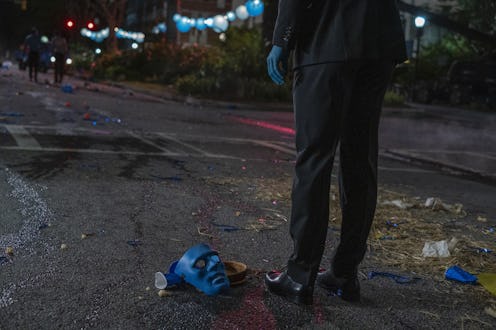
Spoilers ahead for Watchmen. Adrian Veidt may be stuck in space on HBO's Watchmen, but it turns out that Doctor Manhattan has been hanging down on Earth this whole time. While in his Jupiter-moon captivity, Vedit has shown a preoccupation with the blue man and Ozymandias and Doctor Manhattan in the Watchmen comics had a superpowered dynamic. Veidt may be the smartest person in the world, but Dr. Manhattan is actually all-knowing. So for all of Veidt's unbridled confidence in the comics, he sought out Doctor Manhattan's approval in the end and HBO has provided a clue that their relationship didn't end there.
In the second episode of Watchmen, Veidt had his clone servants put on a deadly play about the origin story of Jon Osterman's Doctor Manhattan. The physicist gained his superpowers when he got locked inside a nuclear test chamber while trying to retrieve his girlfriend Janey's watch. In Veidt's play, a new Mr. Philips clone emerged as the blue and naked Dr. Manhattan, who told the servant playing Janey these wise words: "Nothing ends, Janey. Nothing ever ends."
Veidt said the words along with his clone — and that's not just because he fancies himself a terrific playwright (though he probably does). This line is the very last line that Doctor Manhattan speaks to Ozymandias in the Watchmen comics.
The end of the Watchmen comics reveals that Ozymandias has decided to save the world from nuclear war by dropping a pretend squid-like alien in New York City. He killed three million people in the process, but Veidt was able to justify this since he believed he was doing it for the great good. While he arrogantly defended his actions to fellow human superheroes Silk Spectre II (Laurie Blake), Night Owl II (Dan Dreiberg), and Rorschach (Walter Kovacs), that wasn't the case with the omnipotent and omniscient Dr. Manhattan.
When Ozymandias was left alone with Dr. Manhattan after Laurie, Dan, and Rorschach all condemned his actions, the egomaniac dropped some of his self-assuredness. Before Dr. Manhattan was about to leave for Mars again, Veidt rather desperately asked him, "I did the right thing, didn't I? It all worked out in the end." Dr. Manhattan responded, "'In the end?' Nothing ends, Adrian. Nothing ever ends."
These two did share a bond with Veidt admitting in the comics he was fascinated by Doctor Manhattan. Even Doctor Manhattan in the comics noted he had nothing in common with his fellow "costumed adventurers," but that he thought Ozymandias seemed "interesting." But while Veidt may contain high levels of human intelligence, Dr. Manhattan perceives the past, present, and future simultaneously, so they aren't really operating on the same level. And Dr. Manhattan's final words to him very acutely highlight that fact.
Overall though, Ozymandias and Dr. Manhattan's relationship was much more fraught than that last interaction would have you believe. Just pages before, Ozymandias had tried to vaporize Dr. Manhattan. And before then, Veidt gave people close to Dr. Manhattan cancer and created a conspiracy theory that it was the blue man who had given them the disease. It was all a way to get rid of Dr. Manhattan since Veidt believed he was too powerful and would ruin his plans. Yet, Manhattan was actually who allowed Ozymandias' squid conspiracy to go on as a secret — fearing if they exposed it, world peace would be in jeopardy. He even went so far as to kill Rorschach to ensure the truth didn't get out.
As for the Watchmen TV series, it seems these men may have come together in the years between 1985 and 2019. The Peteypedia (the HBO site that provides supplemental materials for the show) contains the medical records of Cal Abar when he went to the hospital for his "accident." It notes that Cal worked for Pyramid Global Construction. In the comics, Ozymandias used his secret company Pyramid Deliveries to do some of his treacherous deeds. So it's possible that Ozymandias was involved in placing Doctor Manhattan into Cal's body.
Even if Veidt isn't involved in Dr. Manhattan living as a human, fans should expect that their paths have crossed sometime in those 30 years — especially since "nothing ever ends." The question is whether or not these genius superheroes are on good, bad, or indifferent terms.